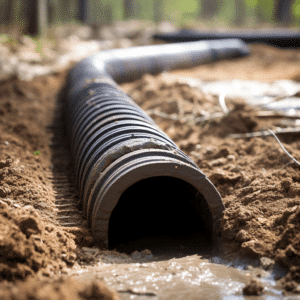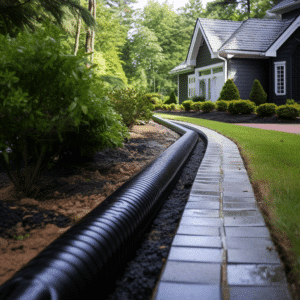Driveway Drainage Pipe, Nobody wants a pond in their driveway or a cracked foundation.
Therefore, it’s essential to think about what type of drainage pipe to use under your driveway as water flows through it and it freezes and thaws throughout the year.
Most experts recommend reinforced concrete or HDPE for driveway drainage pipes. However, the exact type of drainage pipe you should use will depend on your driveway’s unique characteristics like weather conditions and budget.
Three different types of pipes should be used under concrete slabs: drain tile, French drains, and perforated pipe.
Each type of pipe has its advantages and disadvantages: drain tile is only used underground, French drains and perforated pipes are both above and below ground.
In this article, we delve into the different types of drainage pipes and their pros and cons.
Table of Contents
What is a drainage pipe?

Drainage pipes are the veins of your drainage system. They are employed to drain away surface waters, excess wastewater, and other fluids from your premises.
But these pipes are not just for draining. They also play a significant role in providing structural support to the surface or sub-surface slabs, walls, or in this case, your driveway.
Drainage pipes vary in use and material. Some pipes are designed to move water from surfaces like roofs, while others are made to transport water underground because of their materials or structures.
Choosing the right drainage pipe is usually dependent on its purpose. As a result, using price as the main eliminating factor might leave you with undesirable results.
However, good contractors utilize three qualities to ensure that a drainage pipe is up to the task: strength, ease of installation, and size.
What Type of Drainage Pipe To Use Under Your Driveway: Metal or Plastic?
If you live in a home built before the 60s, your drainage pipe system is likely to be metallic.
This is because although plastic was invented in the early 1900s, it was not popularly used as a construction material before the 60s. Metallic drainage pipes tend to be made of less corrosive material like copper.
Why contractors stopped using metallic drainage pipes
Although metal was the material of choice in traditional drainage systems, it’s rarely used in modern installations.
In fact, the only time metallic drainage pipes are used is to repair existing metallic drainage pipes.
Otherwise, if you plan to replace all the pipes in your drainage system, it’s best to replace them with plastic alternatives.
One of the main reasons you should switch from metallic drainage pipes is the material’s tendency to rust.
Weather resistance is a quality that many good contractors look for in building materials.
However, even without rain or consistently wet weather, moisture exists everywhere, more so underground.
In fact, the moisture on the human skin or humidity in the air is sufficient to start the oxidation process on metallic drainage pipes.
As a result, the pipes are likely to rust, with the constantly wet conditions in any drainage system doing little to help.
Metal drainage pipes always have an expiration date because rust is an inevitable eventuality for any metallic material subjected to such wet conditions.
When metallic pipes rust through, they form gaps, become cracked, or in some cases, collapse completely.
A broken pipe in your driveway could cause a massive loss in both damages and replacement costs. You should therefore go for plastic anytime you are choosing drainage pipes.
Types of drainage pipes
As we’ve already established, there are several types of drainage pipes. Below, we look at those types, separate them according to style and material, and where they are best used.
Materials
Concrete
While plastic pipes define the drainage pipe industry, concrete piping is a popular option for industry-level drainage systems. These are drainage systems that utilize heavy-duty pipes and demand zero leaks.
Concrete is also used as a protective outer shell for drainage pipes made of weaker material. For instance, you can use a concrete block as an outer shell for plastic drainage pipes in your driveway.
PVC
Polyvinyl Chloride, commonly known as PVC, pipes are the most common drainage pipes used for any project. PVC pipes can come in any size due to the material’s malleable properties.
PVC pipes are great for drainage systems where the water and environment exert a lot of weight and pressure on the drainage pipes.It is also one of the few types of plastic that can be recycled.
Therefore, if you would like to take a more eco-friendly approach to your driveway’s drainage system, PVC is the way to go.
PVC’s resistance to water pressure and many corrosive chemicals make it one of the most inflexible pipe types.
Polythene
This is the most flexible plastic drainage pipe material. Polythene pipes are ideal for water transportation within short distances with a lot of turns.
However, they are also often thin for flexibility. As a result, they are not the best choice for a driveway drainage system.
Single wall corrugated

These corrugated pipes are often cheap, easy to install, and flexible. Their only disadvantage is that their corrugated properties make them vulnerable to clogging and typically need steeper angles for drainage than regular pipes.
Smooth wall
These are perfect for single-direction water transfer and have a smooth interior surface. However, they are more challenging to install than winding pipe styles.
Dual Wall corrugated
Dual wall corrugated drainage pipes are the compromise between a smooth wall and single wall corrugated drainage pipes. They are not as flexible or easy to install as single-wall corrugated pipes, but they have a smooth wall. As a result, they are usually more costly to install than the two other styles.
To sum it up
Whether you are building a brand new home or replacing the driveway on your existing home, the type of pipe you select to use is definitely something you should consider.
Choosing the best drainage pipe for your needs is important because all drains are not created equal. Picking the right drainage pipe for your driveway will make sure it stays in good shape for years to come.


